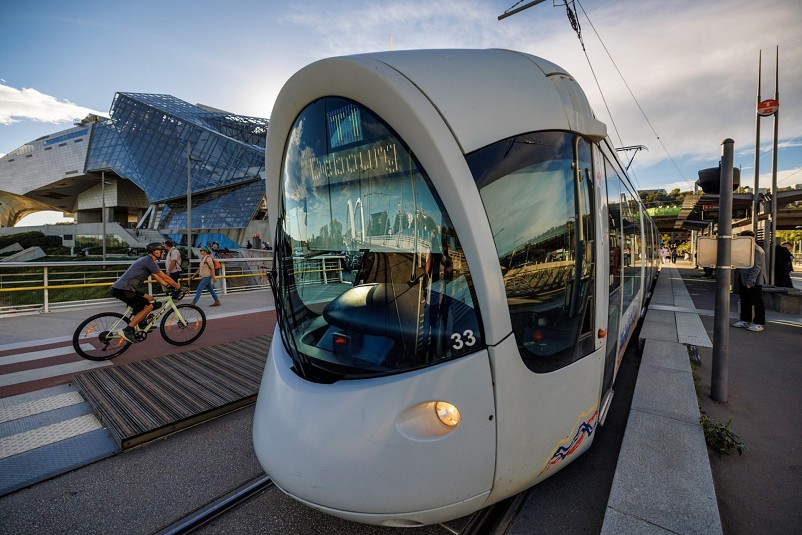
Lyon’s public transport
As a major French city, Lyon attracts new residents every year, both from France and abroad. Its appeal lies in its dynamic economy and its world-renowned universities. But there is more to the city than that. If you are considering moving to Lyon, whether for work or study, you will probably explore all aspects of the city before making your decision. One of its strong points is its transport network. With its various modes of transport and its density, this is definitely one of its main advantages. Here is what you need to know!
What is the transport network like?
Lyon’s transport network is one of the most advanced in France. As one of the largest cities in the country (both in terms of surface area and population), it has developed an adequate and dense network, which is managed by TCL (Transports en Commun Lyonnais). It consists of:
-
120 bus and trolleybus lines
-
4 metro lines with a total of 30 km of tracks and 44 stations
-
2 funicular railway lines directly accessible from the metro
-
7 tram lines linking Lyon with the surrounding cities of Villeurbanne, Bron, Meyzieu, Décines and Chassieu.
The transport network is designed to serve the entire metropolitan area of Lyon. It therefore extends well beyond the city limits. Today, the network serves 73 cities (59 in the agglomeration and 14 others). In total, public transport in Lyon covers 746 km² and 1.3 million inhabitants.
Users have access to 447 sales points, 5 sales outlets, 224 information centres and more than 100 vending machines.


The advantages of using public transport in Lyon
Public transport has many advantages. If you live in Lyon as a permanent resident, the subscriptions make it a cost-efficient solution, with:
-
€22 for a week
-
€10 per month for a child aged between 4 and 10
-
€24.30 per month for a child aged between 11 and 17
-
€25 per month for people aged 18 to 25 and students aged 26 to 27
-
€69.40 per month for people aged 26 to 64
-
€34.70 per month for people aged 65 and over and pensioners aged 60 to 64.
Public transport can also be free in certain circumstances, for example for asylum seekers.
Using public transport is also important to keep Lyon a sustainable city. The network is dense so that it is easy to choose it over the individual car. This is good for the planet and for Lyon’s air quality.
This solution is naturally better for your health, as Lyon transports are built around transit hubs and there is often a bit of distance to reach one’s destination, easily covered by walking or cycling. Not only will you get more exercise, but you will also have more time to enjoy the beauty of the city and its heritage, not to mention its parks, rather than spending time looking for a parking space.
Lyon is complementing its transport system by making the city more accessible to cyclists, by developing cycle paths and by installing 1000 new bike racks every year.


Lyon: A city where you can live without a car
All of this makes Lyon a city where you can live without a car. The city centre is well served by public transport and easy to reach from outside cities.
For example, if you live in Villeurbanne and you want to go to Lumière University Lyon 2, one of the most famous universities in the city, all you have to do is take the metro line A, then the tramway T1, it takes just 27 minutes, including 6 minutes of walking. By car, the best you can hope for is 18-25 minutes, but during rush hour, you can spend up to 40 minutes in traffic instead of resting at home and spending quality time with friends or family.
If you live in the historic centre, you will rarely need a car: everything is close at hand, and if you need to go a little farther than usual, taking the metro will be more convenient, faster and cheaper than going through the hassle of taking out your car. If you do need one, you can join a car club and drive only when you need to, without the costs normally associated with car ownership.
Lyon’s urban planning is designed so that you rarely need to use a personal vehicle, thanks to its efficient transport system and the availability of alternatives such as cycling. The city is even reducing car traffic in the centre by creating more and more pedestrian areas.


The network’s accessibility
Lyon’s public transport has also been designed to accommodate people with disabilities. Guide dogs are allowed on the entire network, and the Optiguide service provides a guide for visually impaired people and wheelchair users.
The entire network has been made accessible:
-
The tramway station’s platforms are at the same level as the car and those are equipped with wheelchair ramps.
-
All buses are equipped with external loudspeakers announcing the line and destination, wheelchair ramps, low floors and special areas for people with disabilities. All bus stops are announced by loudspeakers inside the bus and an audible signal is used to warn passengers when the doors are opening and closing.
-
The metro and funiculars are also designed to be accessible. Wheelchair ramps are being installed on all lines. All stations are accessible (except Croix-Paquet on the line C). Inside, a loudspeaker indicates the direction of the train and the street on the surface.


Come to work or study in Lyon
As you can see, if you come to live or study in Lyon, you will enjoy a high-quality transport network in an exciting and dynamic city. Interested? Find out more about it and prepare for a new life at the heart of France!
Do you have a question? Our teams are here to answer you!
Fields marked with an asterisk (*) are mandatory.


